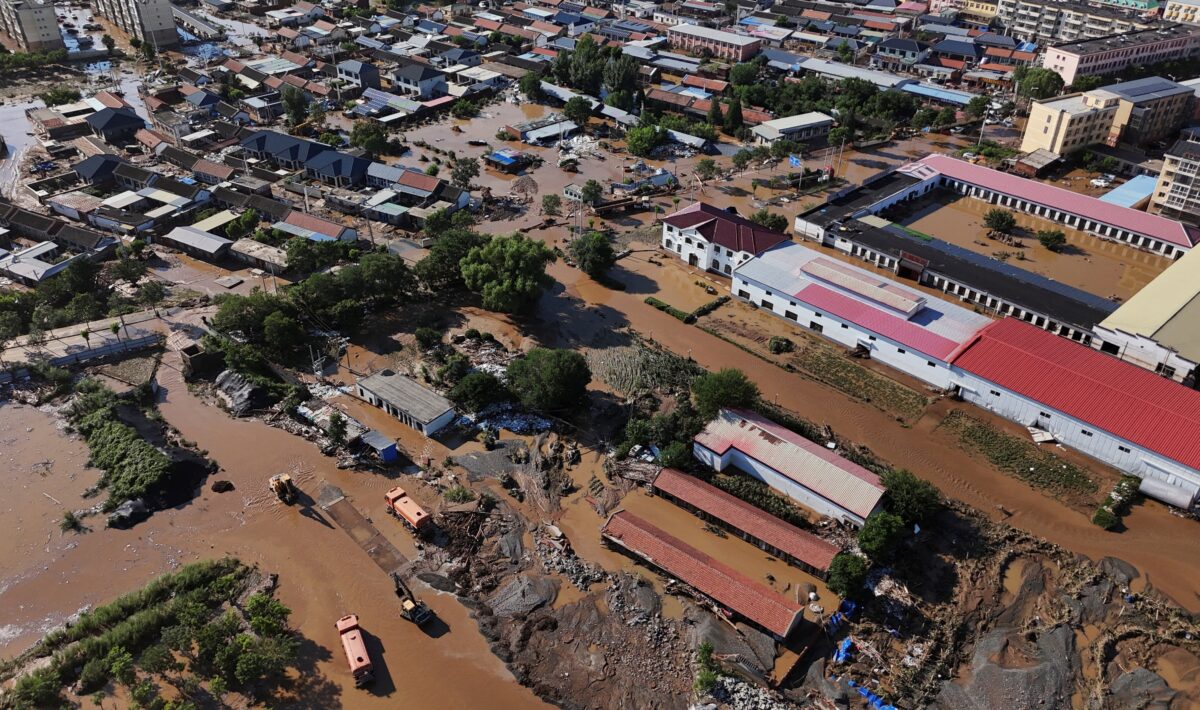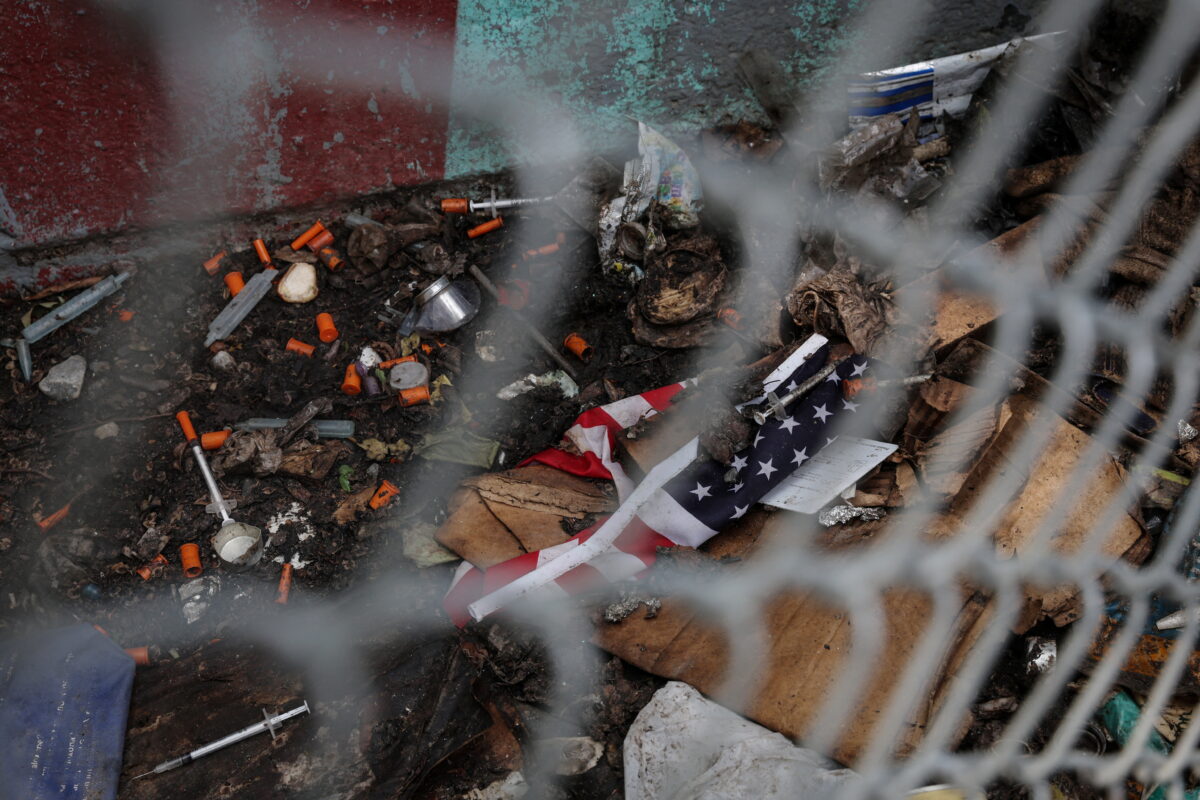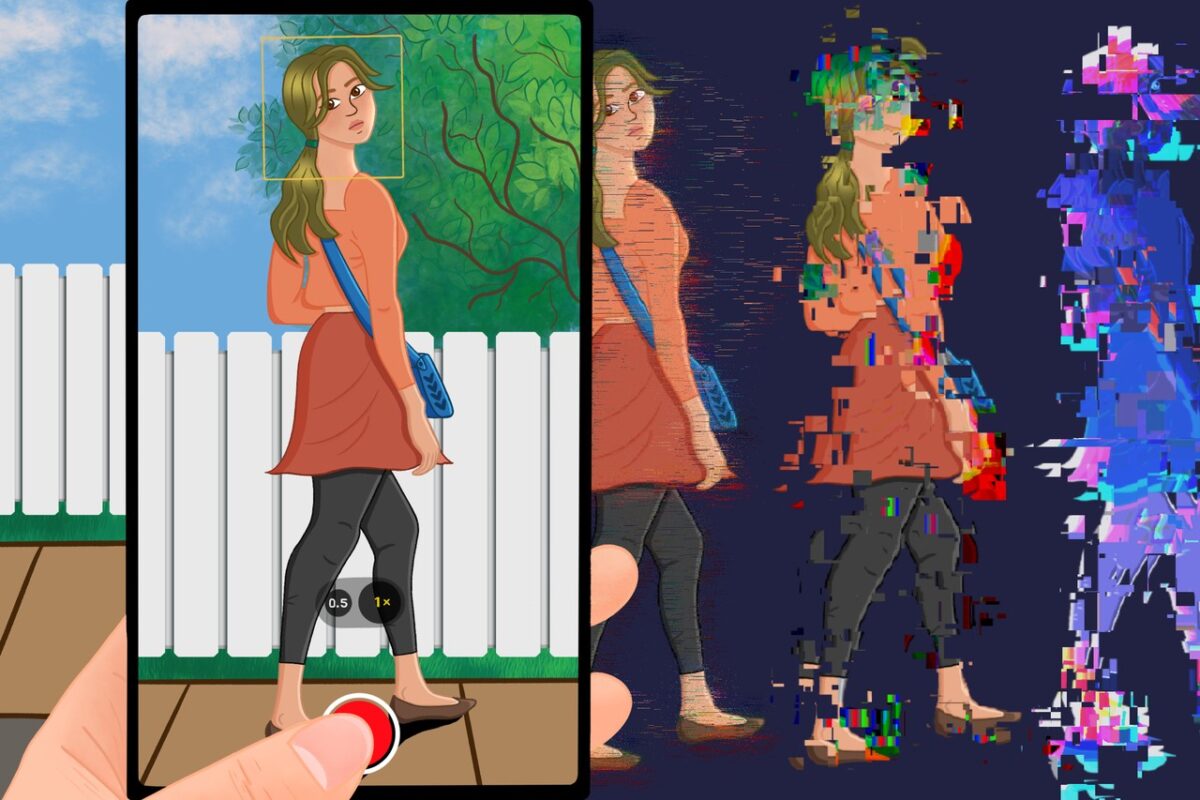The Rise of Nitazenes: Chinese Suppliers Behind Ads for Deadly Opioids Targeting Europe
This article is the result of a collaboration with Estonian publishing partner Postimees. You can find Postimees’ corresponding piece here.
A young woman dressed in a school uniform poses in front of a bag resembling breadcrumbs. A phone number, an email, and two QR codes are listed above her head. At the center of the image, in large yellow-and-red font, is the word “Isotonitazene”.
The description says “delivery is guaranteed” and that the brown powder can be shipped safely to Europe, the US, the UK and beyond: “If you are interested,” it says, “kindly contact with me.”
The advertisement appears harmless, but it is far from it: isotonitazene is a type of nitazene, a class of synthetic opioids up to 40 times stronger than fentanyl and up to 500 times more powerful than heroin.

Nitazenes were developed in the 1950s by a Swiss chemical company as a new type of painkiller, but the drug was so potent that it was never approved as a medicine. Even trace quantities can cause an overdose.
Decades later, nitazenes have re-emerged in the underground drug market: they have been detected in counterfeit prescription medicines, including fake oxycodone and benzodiazepines pills, and in street drugs, including cocaine, heroin and ketamine.
The UN drugs agency and countries around the world have warned of the major health risks posed by nitazenes. The super-strength opioid has already caused hundreds of deaths in Europe, the UK and North America.

A months-long open source investigation by Bellingcat and publishing partner Postimees has identified a trove of more than 1,000 online adverts selling six of the most common types of nitazenes and offering worldwide delivery.
The investigation team analysed the websites, social media accounts and contact details related to the ads, and searched business registries for information on companies associated with the drug sales.
It established that a series of entities linked to the advertisements match listings for companies on China’s corporate register — including one registered company that is advertising scores of nitazenes online.
Requests for public information, including court files and customs records, uncovered additional evidence linking nitazenes shipments seized in Europe back to China.

The findings come as recent geopolitical events threaten to exacerbate the flood of nitazenes globally. In 2019 China banned all variants of fentanyl, a potent opioid that is fuelling the most lethal drug crisis in America’s history. And in 2022, a “poppy ban” imposed by the Taliban led to a massive drop in opium production in Afghanistan, the source of virtually all the heroin supplied to Europe.

Support Bellingcat
Your donations directly contribute to our ability to publish groundbreaking investigations and uncover wrongdoing around the world.
Experts say these factors have opened up a vacuum for alternative synthetic opioids – such as nitazenes – to emerge. “At some stage we know for sure heroin will dry out, and then there’s a danger that some of those people [drug users] may go into nitazenes,” said Thomas Pietschmann, a senior research officer with the United Nations Office on Drugs and Crime. “And that’s a particular danger because of its high potency.”
Hiding in Plain Sight
Advertisements for nitazenes have infiltrated all corners of the internet: from an Australian sport fishing forum and a Congolese media outlet, to a Singaporean property site and ISSUU, a major publishing platform.
They were found on dozens of websites, including prominent Asian-headquartered marketplaces targeting international buyers, such as TradeFord, TradeKey, TradeAsia and IndiaMART. The ads also appeared on LinkedIn and the social media site X.
The platforms that responded to questions from Bellingcat last week pledged to pull nitazenes ads from their websites, but at the time of publication listings for the drugs still littered the internet.

Often, the suppliers of nitazenes are listed as Chinese companies. But these organisations are shape-shifting entities. Sellers hide behind opaque business structures: they regularly change addresses, use multiple emails and phone numbers, and promote contact via messaging platforms such as Telegram. Some appear to photoshop their names onto images of large factories. Many use generic photographs of young models or celebrities to market their drugs.
Corporate Chameleons: Food Additives, Nitazenes and Sanctions
Hebei Yingong New Material Technology Co Ltd is one of many purported chemical manufacturers linked to multiple online advertisements for nitazenes and other designer drugs. While this company is listed in corporate records as “inactive” and its websites are down, as is typical with other Chinese nitazene suppliers, its ads are still visible online.

An archive of Hebei Yingong’s profile on Alibaba.com includes the contact details and a photo of a salesperson named “Lisa Lau”. However, a reverse image search on Yandex shows that the image is, in fact, of a Taiwanese actress named Ning Chang.

While Hebei Yingong’s listings on Alibaba.com did not include nitazenes and were mostly for food additives, the profile linked to the Chinese version of the company’s website: yingongchem.com. Selecting “English” on the homepage redirects the user to hbyingong.com, the domain that is listed on numerous nitazene ads, confirming the two sites are connected.

On yingongchem.com, the Chinese site, the company is described as the successor of “Hebei Huanhao Biotechnology Co., Ltd”, an entity previously sanctioned for advertising or supplying fentanyl precursors. A photo on the website, showing people apparently on a factory tour with the label “customer group photo”, shows the sanctioned company’s name in English.

A 2023 InSight Crime report on the flow of precursor chemicals to Mexico said Hebei Huanhao Biotechnology was part of a network of clans that had access to a chemical production and distribution system. The report noted that companies in this network “often share offices, websites, social media channels, email accounts, and employees”, ensuring operations continue even if one company is sanctioned or shut down.
Bellingcat called a number listed on Hebei Yingong’s company records and spoke to a representative who confirmed she was from the company. When asked about its advertisements for nitazenes, she said the company had been dissolved in 2023 and denied that it ever sold or advertised the drugs. She suggested it was possible that other people had listed ads under its name. Yet, she also said the company “no longer had such products”, and that advertisements it had posted were removed when the company shut down.
While the majority of these entities conceal themselves behind intricate Russian Doll-style company structures, some openly advertise nitazenes on their websites, even acknowledging that their use has led to deaths.

Others have ties to major criminal networks involved in the global illicit fentanyl trade. Hanhong Pharmaceutical Technology, for example, was sanctioned in October 2023 by the US Treasury for trafficking drugs including fentanyl and nitazenes into America. The company is owned by Du Changgen, leader of a China-based illicit drugs syndicate said to be responsible for manufacturing “ton quantities” of nitazenes, fentanyl, MDMA, methamphetamine and other chemicals.
In October 2023, the US Treasury also sanctioned Jiangsu Bangdeya New Material Technology, a Chinese company accused of shipping protonitazene and metonitazene to Florida since April 2022. Authorities said an intermediary company that accepted wire payments on behalf of Jiangsu Bangdeya was “affiliated with” Yip Chuen Fat, who is the subject of a US $5 million bounty for information leading to his arrest or conviction. Yip Chuen Fat is alleged to have operated the Yuancheng Group, a chemical company accused of trafficking methamphetamine, fentanyl and other synthetic drugs to America.

Hiersun Biotech Company Limited is another entity linked to online advertisements for nitazenes. An email address for this company is listed as a contact on another website which, according to a report by a select committee of the US Congress, appeared to be controlled by Yafeng Biological Technology, a chemical company owned by a state prison accused of human rights abuses.
This investigation found that seven additional entities advertising nitazenes online match listings for companies on China’s corporate register. Six of these companies have been officially deregistered, but ads for nitazenes under their names remain active, either on their own websites or third party platforms. The seventh company, Guangzhou Wanjiang Biotechnology Co., Ltd. is registered as active and currently lists a range of nitazenes online.
Guangzhou Wanjiang Biotechnology
Guangzhou Wanjiang says it offers a safe door-to-door delivery service, including to Europe, the UK, the US and Australia, boasting of “discreet” packaging and shipments that “100% pass customs”. The chemical company’s website advertises metonitazene, etonitazene, isotonitazene and protonitazene, and its Telegram account regularly posts images and videos of various drugs, including nitazenes.

Bellingcat verified that Guangzhou Wanjiang is a registered company in China via a corporate records search, which also confirm its web domain. According to corporate documents, the company is being liquidated, however it is still listed as “active”. At the time of publication Guangzhou Wanjiang had multiple listings on its website selling different kinds of nitazenes, including two of the most common types of the drug.

On Christmas Day, the company wished its clients a happy holiday. “Thank you for your continued support and partnership throughout the year,” it said on Telegram. “May your holidays be filled with joy, peace, and love.”
Certified Enterprise: Behind Guangzhou Wanjiang’s Operation
Websites in China must obtain an Internet Content Provider (ICP) filing from the government to operate legally, according to the EU SME Centre. A search for gzwjsw.com on the Chinese government’s ICP portal confirms that it is registered on this official system. The record lists Guangzhou Wanjiang Biotechnology Co., Ltd, along with the same government-issued ICP number displayed on the footer of the company’s nitazene-advertising website.

Guangzhou Wanjiang had a listing on ChemicalBook, a chemical e-commerce platform, which was tagged with an “enterprise certification” badge. According to ChemicalBook, certified companies have submitted their corporate registration information for review and approval by ChemicalBook staff in order to “improve customer trust”.
Guangzhou Wanjiang’s ChemicalBook page showed the same name, website and registration number recorded in the company’s official records. A US Congress Select Committee report on the Chinese Communist Party’s “role in the fentanyl crisis” said verification systems such as ChemicalBook’s “corroborate that these companies are providing their true names and undercut any claim … that they had no idea that these illicit activities were ongoing”.
ChemicalBook said it had not been aware of the nitazene ads on Guangzhou Wanjiang’s website and would “contact it immediately to delete the relevant information”. The ChemicalBook listing was also removed last week.
Guangzhou Wanjiang’s ChemicalBook listing had linked to the QQ instant messaging profile of a sales representative named “Anna”. Information contained in this link forms a connection between Guangzhou Wanjiang and advertisements under the name of a different company, Hebei Xiuna Commerce and Trade Co., Ltd. This entity was sanctioned by the US in October 2023 as part of measures targeting Chinese illicit drug producers.
The URL contains the unique QQ ID number assigned to the user on signup, which is also used as the prefix for that user’s qq.com email address. A Google search for the user’s email address returns two listings for children’s bikes and skateboards, which are linked to the company names Hebei Xiuna Commerce and Trade Co., Ltd and Hebei Xiuna Trading Co., Ltd respectively. The listings include the aforementioned QQ email alongside another email address recorded in the sanctions notice for Hebei Xiuna Trading.
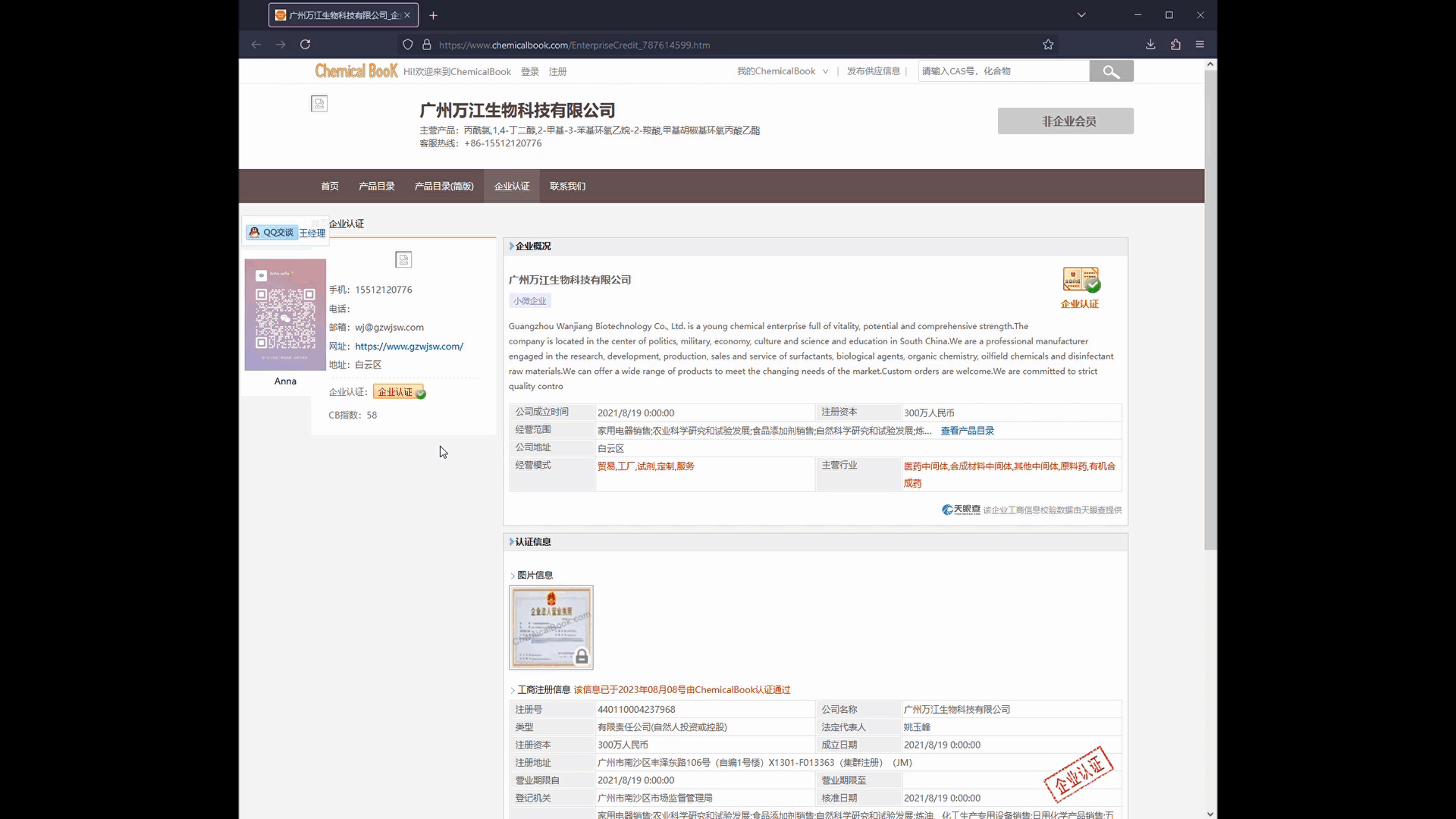
This finding corroborates earlier reporting by C4ADS, a Washington DC-based non-profit focused on illicit networks, which found that companies associated with illicit Chinese fentanyl sales were linked to advertisements for children’s bicycles and toys.
Emails to addresses associated with Guangzhou Wanjiang bounced or were not returned. A woman who answered a number listed on a Guangzhou Wanjiang advertisement said she did not know what nitazenes were and was not part of the company. Repeated attempts to reach other numbers associated with the company or listed on its advertisements were unsuccessful.
Estonia: Europe’s Ground Zero For Nitazenes
In April 2019, Estonia became the first country in Europe to identify isotonitazene in drug seizures. New types of the drug followed and, over the years, Estonia recorded a rise in the proportion of nitazene deaths: half of all drug-related deaths over the past two years were caused by nitazenes, according to the most recent official figures.
Estonia is no stranger to synthetic opioids: it faced one of the first fentanyl epidemics in the world in the early 2000s, lasting nearly two decades and causing almost 1,500 deaths. After Estonian police cracked down on fentanyl labs in 2017, the drugs largely disappeared. But they were soon replaced by an even deadlier substance.
Nitazenes are now spreading rapidly in Estonia. They have taken hold, experts say, because the synthetic opioids can be bought cheaply and sold for many times the price, making them highly profitable for drug dealers. In less than three years, 127 people have died from nitazenes in Estonia.
An analysis of criminal court verdicts shows almost 80 cases linked to nitazenes since 2020. They detail multiple cases of users and sellers carrying less than one gram of nitazenes, which are concealed in myriad ways: from envelopes and sachets, to being stuffed inside chocolate Kinder eggs. The drugs are so potent that the judicial system considers possession of even one milligram of pure protonitazene to be a criminal offense.

This investigation has linked a recent Estonian nitazene seizure case to China using publicly available documents. A court verdict from August 2024 shows a man was jailed after ordering two shipments of protonitazene. Postimees was granted permission to inspect court files related to the case, which showed one batch of drugs was ordered from a US phone number listed on a Chinese website which hosts online advertisements offering pharmaceuticals for sale.
Archived versions of the website, which say it is based in Nanjing city, show that it previously advertised three types of nitazenes, including protonitazene. These drugs have a “99 percent purity” level, according to the ads, and are transported in 1kg and 5kg bags or 25kg drums. Archived versions of the site say the pharmaceutical company is focussed on “serving foreign customers” and that its products have been sent to more than 30 countries. The court judgment said the drugs were shipped from a DHL distributor in Germany before arriving in Estonia.
Authorities in Norway have also seized nitazenes originating in China. Seven packages containing the drugs and totalling more than 150g were seized during 2023, according to public records requests to Norwegian Customs. The largest of the packages, 90.4g, was shipped via FedEx to Oslo’s main airport from Hong Kong.
Bellingcat and Postimees have uncovered another link between Chinese-made nitazenes and Europe. One package of yellow powder, which was labeled as “nail paste”, was intercepted in Stockholm in August 2019. The package, which testing showed contained almost 49g of isotonitazene, had been couriered from Shanghai, according to documents obtained through a public request to Swedish customs.

Nitazenes Spread Across Europe
Sweden, which has recorded 37 nitazene-overdose deaths, is one of at least 20 European countries that have identified the drugs within its borders since 2019. In the UK, authorities confirmed 179 deaths related to nitazenes between June 2023 and May 2024. In Ireland, nitazene outbreaks in 2023 caused 77 overdoses. And in Latvia, the number of deaths associated with nitazenes rose from two in 2022, representing just 3 percent of all drug-related fatalities, to 38 in 2023, making up 29 percent of the country’s drug deaths. The US, Canada and Australia have also grappled with outbreaks over the past five years.

Often the drugs are sold as fake painkillers, such as OxyContin or Subutex. In 2023, almost 6,000 fake Oxycodone tablets containing N-desethyl isotonitazene were seized in Portugal and 12,600 fake Oxycodone tablets containing metonitazene were seized in Poland. Also in 2023, police in the UK seized 150,000 tablets of nitazenes, the country’s largest ever seizure of synthetic opioids. More than 3,000 fake OxyContin tablets containing metonitazene were found in a Polish taxi entering Sweden.

Swedish authorities recently said nitazenes and other drugs had been ordered on Darknet websites, including Flugsvamp 4.0 and Archetyp. UK detectives also suspect the Darknet as a source of nitazene supply.
Bellingcat and Postimees identified two accounts claiming to ship nitazenes to the UK. Some of the hundreds of reviews posted on these accounts tell a bleak story about how users are being taken off-guard by the drug’s strength.

Nitazenes are so potent that they can be shipped in tiny quantities, making it difficult for police and customs to identify. While hundreds of seizures have been made over the past five years, the total quantity of nitazenes intercepted in the EU amounts to less than 20kg, according to data shared by the European Union Drugs Agency.
“For the time being, we’re still speaking about very small quantities,” said Pietschmann, from the United Nations Office on Drugs and Crime. “But it’s a market which is developing and we have to be very, very careful.”
China banned nine types of nitazenes in 2024 in an effort to control their spread. But 23 variants of the man-made drug have now been confirmed worldwide, up from just one in 2019. As manufacturers adapt to new regulations, companies continue to sell the potent opioids online – on their own websites and third party platforms.
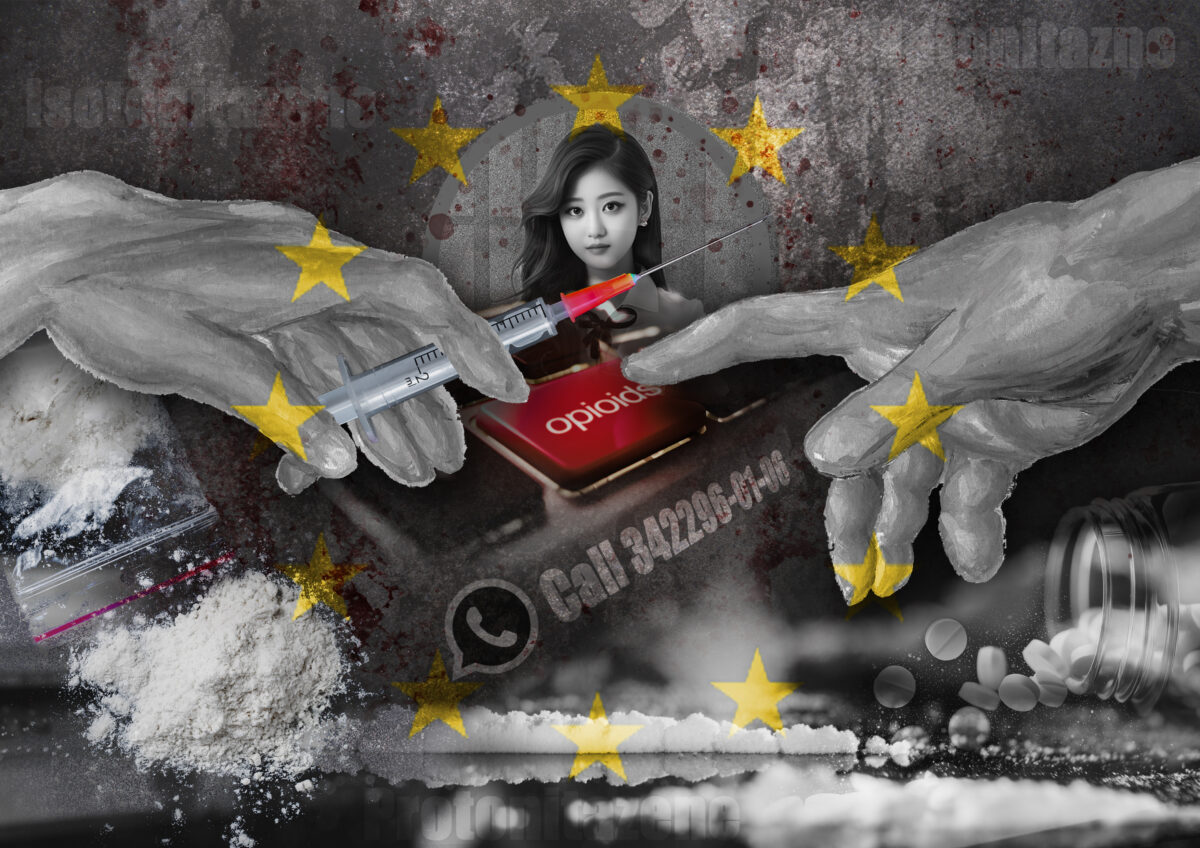
Obtaining nitazenes appears to be a simple process, with buyers able to make direct contact with sellers via direct messaging services listed on ads that appear on legitimate trading and social platforms.
Bellingcat contacted the platforms hosting nitazene ads referenced in this article. Those that responded said ads for illegal drugs were prohibited on their platforms and would be removed.
TradeAsia took down the nitazene listings from its site last week and sellers who violated its policies would have their accounts frozen. “After reviewing the provided links and understanding the associated risks and regulations, we have decided to immediately remove the product listings for nitazenes from our website,” a spokeswoman said. “These accounts will remain permanently frozen, with no possibility of reinstatement.”
TradeFord said ads for illegal drugs went against its terms and conditions and removed nitazene listings last week. A spokesman said a search had identified more than 200 nitazene ads on the platform and that it had now “blocked” keywords associated with different types of the drug.
ISSUU, which had nitazene advertisements posted as recently as last month, said the ads that were flagged went against its terms of service and were removed “as soon as we become aware of it”. A spokesman said work was underway to improve policies and practices to safeguard users, including building automated technologies “to identify and weed out” these types of ads.
LinkedIn said content that promotes the sale of illicit or recreational drugs was prohibited and that it had removed examples of nitazene posts for violating its policies. But at the time of publication, some ads for the drugs remained on the platform. “People rightly expect LinkedIn to be a professional place free from inappropriate activity – and promoting or facilitating access to illegal or regulated goods and services is not allowed on LinkedIn,” a spokesman said. “Whenever we see posts, ads or accounts that don’t meet our policies, we remove them.”
IndiaMart, TradeKey and X had not responded to questions as of publication. Emails to the sanctioned companies bounced or were not returned, and their phone numbers were no longer active.
Jonathan Moens, Margus Hanno Murakas, Connor Plunkett, Katherine de Tolly and Ilvija Bruge contributed to this article. This article was developed with the support of Journalismfund Europe.
Bellingcat is a non-profit and the ability to carry out our work is dependent on the kind support of individual donors. If you would like to support our work, you can do so here. You can also subscribe to our Patreon channel here. Subscribe to our Newsletter and follow us on Twitter here and Mastodon here.
